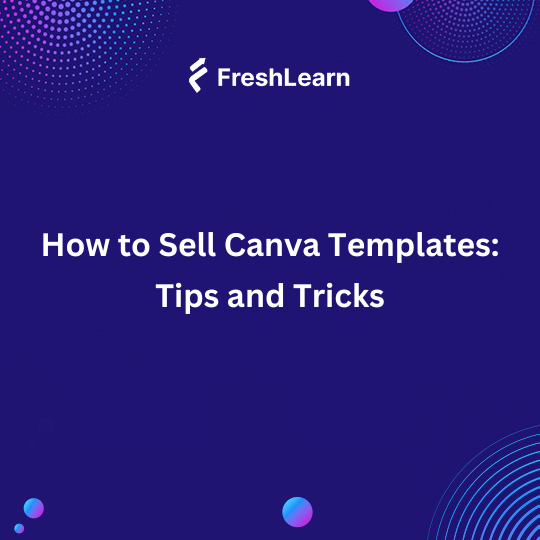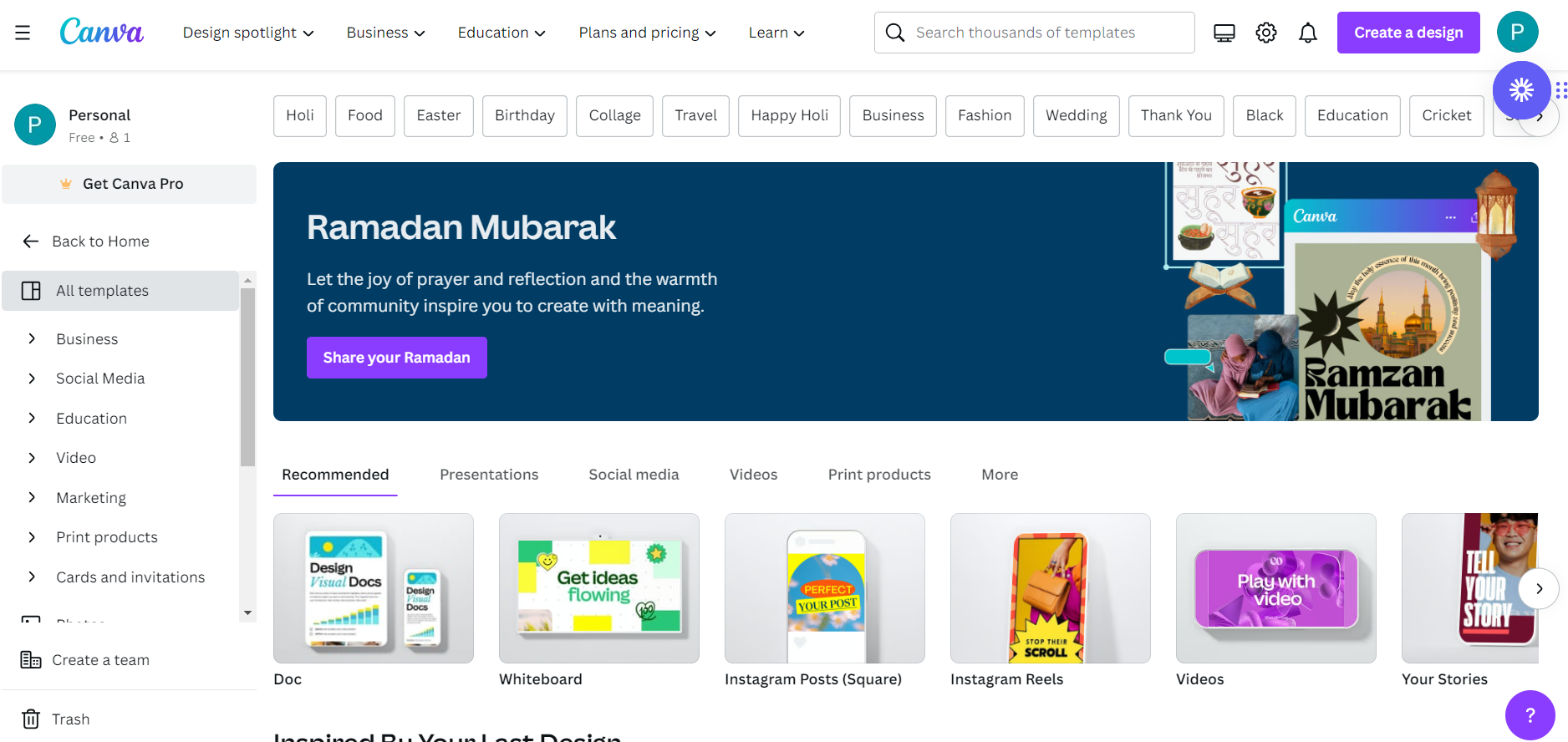
How to Sell Canva Templates: Tips and Tricks
With 150 million people using its service as of 2023, Canva has grown to new heights surprisingly quickly. The platform for creating images and graphics, trimming videos, enhancing and editing images, and adding frames, text, and effects to photos is in everyone’s toolkit these days, it seems.
Part of that has to do with the fact that Canva is primarily free. You can access all its features, but not necessarily all the fonts and effects unless you opt for the paid plan.
Have you created some killer Canva templates and are starting to see a market for selling them? You’re in the right place. This guide to selling Canva templates will tell you everything you need to know to springboard your goals.
What Kinds of Canva Templates Can You Sell?
Although Canva is easy enough for anyone to pick up and use, it has some intricacies that require time and patience in the program. You’re a more accomplished user who has created templates others can use, and now you’re interested in monetizing.
Here are some templates you can put on the marketplace.
Print Products
- Stickers
- Flyers
- Letterheads
- Note cards
- Insulated tumblers
- Return address labels
- Wrapping paper
- Resealable pouches
- Magnets
- Pint glasses
- Booklets
- Magazines
- Acrylic tumblers
- Wine tumblers
- Shipping envelopes
- Decals
- Mouse pads
- Notepads
- Wall calendars
- Paper bags
- Coasters
- Bumper stickers
- Sweatshirts and t-shirts
- Water bottles
- Notebook covers
- Tote bags
- Tags
- Envelopes
- Mugs
- Bound documents
- Gift certificates
- Canvas prints
- Infographics
- Resumes
- Cover letters
- Yard signs
- Phone books
- Retractable banners
- Folded cards
- Rack cards
- Business cards
- Banners
- Posters
- Brochures
- Postcards
- Business cards
- Invitations
Videos
- Twitch backgrounds
- Twitch screens
- TikTok videos
- LinkedIn video ads
- Instagram reels
- Portrait feed ad videos
- YouTube video ads
- Video collages
- YouTube videos
- Mobile videos
- Video messages
- Facebook videos
Social Media
- Instagram ads
- Instagram Story highlights
- Facebook event covers
- LinkedIn background photos
- Facebook ads
- Pinterest pins
- Twitter posts
- YouTube banners
- Animated social media posts
- YouTube intros
- YouTube thumbnails
- TikTok videos
- Instagram Reels
- Facebook covers
- WhatsApp statuses
- Instagram Stories
Other
- Presentations
- Phone wallpapers
- Bookmarks
- Blog graphics
- Programs
- Lesson plans
- Book and eBook covers
- Responsive invoices
- Graphic organizers
- Album covers
- Concert maps
- Class schedules
- Responsive proposals
- Comic strips
- Planners
- Reports
- Worksheets
- Posters
- Calendars
- Websites
- Zoom virtual backgrounds
- Magazine covers
- Mind maps
- Graphs
- Desktop wallpapers
- Photo collages
- Infographics
How to Sell Canva Templates in 4 Simple Steps
Are you ready to get started? Make money selling templates on Canva following these steps.
Step 1 – Create Your Canva Template

Before you can sell templates, you need to have some created. Canva has so many types of templates you can build and sell, so how do you choose?
Well, you might begin producing templates in an area you know a lot about, like YouTube videos or resumes. You could start with templates that are easier but still monetizable, as you’ll build your Canva skills the more you work in it.
Some Canva creators limit themselves to one type of template as a specialty service while others selling Canva templates have a broad range to accommodate for more everyday needs.
When designing Canva templates to sell, keep these points in mind:
- Use negative space, also known as whitespace. This will make it more cost-effective to produce your templates on a wide scale and make them more visibly pleasing.
- If using more than one font, select two with noticeable contrast from one another that are still complimentary.
- Incorporate transparent icons as it makes sense to, and underscore the most critical elements using different typefaces, colors, and font sizes.
- Keep the color palette to only four hues to prevent the design from being too busy.
- Make your design original (within the confines of Canva).
- When in doubt, simple is always best.
You can save your Canva templates in many file formats, with PNG and JPG the most popular. While JPGs are smaller files, they reduce the original image quality, leaving something to be desired. You might not sell as many templates as saving your files as PNGs.
Step 2 – Determine Where You’ll Sell
The next consideration is where you’ll sell Canva templates. You should focus on a platform that’s popular enough that you can make money selling templates yet not oversaturated to the point where every competitor of yours is on there.
Since there’s no reason to limit yourself to only one platform, here is a mix of popular and lesser-known options to explore.
Etsy
With more than 95 million buyers and 7.5 million sellers as of 2024, Etsy has a huge following that seems to only continue getting bigger. It’s a bespoke marketplace intended for selling your own original creations, making it an excellent platform for selling Canva templates.
You can create an Etsy store for free. However, you’ll pay $0.20 per item you list on the site. All listings only last for four months; if you want to keep the item for sale online on Etsy after that, you have to pay the fee again.
Additionally, you will pay a delivery transaction fee of 6.5 percent of the item’s cost and whatever the fee is for gift wrapping and shipping. If you use Etsy Ads, you must also pay promotional and advertising fees; the same goes for Offsite Ads.
Sellfy
Sellfy lets you sell on your website or through social media using its platform, answering the question of how to sell Canva templates. You can start for free on a trial basis, then select from one of three paid plans: Starter for $29 a month, Business for $79 a month, or Premium for $159 a month.
The plans cap you on annual earnings, with the Starter plan limiting you to $10,000 in sales, the Business plan $50,000, and the Premium plan $200,000.
Creative Market
A competitor of Canva, Creative Market is an online marketplace for creating graphics and designs. You can select from more than three million templates, photos, themes, graphics, and fonts.
Whether you use Canva or Creative Market for your designs, you can rely on the latter service for opening a shop and selling your templates.
Creative Market takes care of marketing expenses and credit card processing fees, which sounds great, but you only make 50 percent of what the list price is for your templates (or any other products sold here).
Further, you must pay a Platform Fee, a fixed price per order for delivery and hosting.
Gumroad
The eCommerce service Gumroad should be on your radar for selling Canva templates. It’s more affordable than some of the other services you can consider, with a 10 percent flat fee. Gumroad also doesn’t charge monthly to use. However, its 10 percent fee doesn’t include PayPal or credit card processing fees.
Canva
Did you know Canva has its own contributor program? It’s a covetable enough program that Canva has to pause registrations due to high demand, so you’ll have to check back later if you can’t join at the moment.
Part of what makes Canva an appealing marketplace to sellers is that you can list your templates for free. A content license, which Canva requires, is also available for free, but you’ll have to pay to obtain a Pro Content license if you have the free plan (you don’t pay for it if you bought a paid plan).
However, a Pro Content license only allows you to use selected content per design. So, if you wanted to use the content in another design, you’d have to get another Pro Content license.
Canva doesn’t allow you to use Pro Content license content when selling templates.
Your Website
The last option is selling Canva templates on your website. You should have a website for marketing purposes (more on that in a moment), so you might as well use it as your store.
Compared to the other eCommerce marketplaces, your website has far less competition since it’s one of a kind. You can also pay little to get a site up and running, making it a cost-effective option.
However, you will have to market your Canva templates harder since you’re not already starting on a well-known and used platform.
Step 3 – Price Your Canva Templates

The price of Canva templates varies from $12 to $100 per template. You get to select your price whether you sell templates through Gumroad or your own website.
The higher you price your templates, especially out of the gate, the harder it will be to gain a foothold. Lower prices are better as you first get started. As you build order volume, you’ll have a good influx of income. You can then increase your prices as your templates become more popular.
No matter what you set your price, the third-party eCommerce platform you use will take its cut one way or another, so keep that in mind.
Step 4 – Promote Your Canva Templates
Just because you’ve listed your Canva templates doesn’t mean a sale will automatically happen. You have to promote your store and products. Here are some strategies for doing so:
- Join the Canva Affiliate program, which gives your customers a Canva Pro trial for free when they purchase your templates. Canva mentions you can make royalties on the templates you sell through its platform.
- Post on social media, sharing your store link on Twitter, Facebook, YouTube, TikTok, and Instagram. However, don’t spam your link. Consider adding it to your bio.
- Showcase your templates on visual social media platforms, including Instagram and Facebook. Giving people a taste of your work could make them eager for more.
- Get on Pinterest and add pins of your favorite templates. Insert your store link into your Pinterest bio.
- Start an email list and drop updates whenever you have new templates available.
- Pay for advertising, with options like pay-per-click and social media advertising available.
How Much Can You Make Selling Canva Templates? Can You Make a Living Selling Canva Templates?
These are difficult questions to answer, as they’re dependent on how much you price your templates and how many you sell.
You’re in a good position to make money selling templates if you follow the advice above. It may still be slow going at the start, but it should begin picking up as you continue promoting your store and selling more templates.
Let’s say you sell a template for a fair price of $10 each. That’s $1,000 if you sell 100 in a month. That may not be an attainable goal for your first month, but it’s certainly doable once you’re several months in.
While $1,000 a month is a nice chunk of change, many of us would agree that it’s not enough to live on.
If you sought to make a living by selling Canva templates, you’d either have to increase the volume or your price.
For example, if you increase the cost to $100 a template, you can earn $10,000 a month simply by selling 100 templates. That you can easily live off of.
Rather than make it an all-or-nothing situation, you might price your templates variably, with some more expensive than others.
Wrapping Up
Selling Canva templates can be a great way to bring in some side income, or you could even turn it into your full-time gig. Having original, attention-grabbing templates is critical, as is fairly pricing them as you get started.
Selecting a platform or choosing your own website is a hard choice. Consider what you can afford to spend on startup costs to guide you, and don’t forget to factor marketing into your budget!


